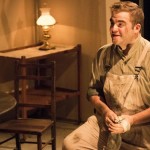Eileen Caiger Gray reviews KRAPP’S LAST TAPE with Richard Wilson at Crucible Studio, Sheffield
It’s double Krapp from Richard Wilson in Samuel Beckett’s forty-five minute, one act, one man play, as the 69 year old Krapp reacts to a tape recording he made of himself at the age of 39, thereby summing up his whole ridiculous, comfortless existence. This ‘miniature masterpiece’, written in 1958 for Northern Irish actor Patrick McGee, has since been performed by Corin Redgrave, John Hurt, Harold Pinter and Michael Gambon. Richard Wilson has worked for some years as Associate Director at the Crucible but this is his first acting role, directed now by Polly Findlay.
Shabby, shambling, alone, the old man moves, but mainly sits, enshrouded in the dimly-lit gloom of his shabby office-den as he listens to the voice of the person he was thirty years back when he recorded this diary tape. His hopes, ambitions and resolutions having come to nought, Krapp now mocks the unrealistic expectations and ideals he had as a young man when he withdrew from the world to write his magnum opus only to find he really hadn’t got one to write.
The novelty of this Crucible production is that Krapp and his life are totally encased onstage in a rectangular box like a builder’s prefab office. As if peering in at a cornered creature, we watch Krapp through the long, rectangular windows (some meshed) as he ambles from ancient table and chair, to messy shelves and files, unlocking stashes of booze and bananas and returning to turn on his reel-to-reel tape-recorder. To cater for an audience in the round, from start to finish this joyless space, like his life, revolves slowly and laboriously round and round.
With Beckett’s work, though, it’s often in silences and still, still, stillness that audiences can properly absorb and distil the concise words and thoughts, the quirky repetitions, the pathos, the comedy and irony of the piece, helping them engage more fully with the characters. Sadly, this Beckett in a Box seems to offer too much frustrating distraction.
The box metaphor of Krapp trapped in lonely isolation by the shabby, degenerating confines of his unfulfilled life works fine, but in practical, physical terms, it doesn’t work so well. While our eyes constantly strain to track the slowly revolving Krapp (annoyingly missing, at times, what others have seen), our ears are assaulted by the constant tap and creak of the mechanism. Maybe this echoes Krapp’s own heavy burden of coughs and sighs, but as a result, we lose the beauty, the eloquence and the hostility of stillness and silence. It’s harder too to concentrate fully on the taped voice of the younger Krapp, its delivery, perhaps, not sufficiently differentiated in tone and animation from Wilson’s delivery as the older man.
Nice comedic moments arise from bananas, taking tipples in the dark and from playing with the delicious sounds of the words ‘spool’ and ‘viduity’, while Wilson’s Krapp, far from raging or wallowing in self-pity over a lonely life that’s amounted to little, largely brings us numb resignation. He’s glad it’s all over and done with.
It would be too cruel to say so are we, but it’s true that, for the most part, the noisy, groaning barrier of the Beckett box with its perpetual motion and receding views does spoil the impact and intimacy of the play. Though we see Krapp’s isolation, it’s hard to really feel it from so far outside. Maybe complexity is still better achieved in the simple, the static and the silent.
Eileen Caiger Gray
The show runs until July 19th




